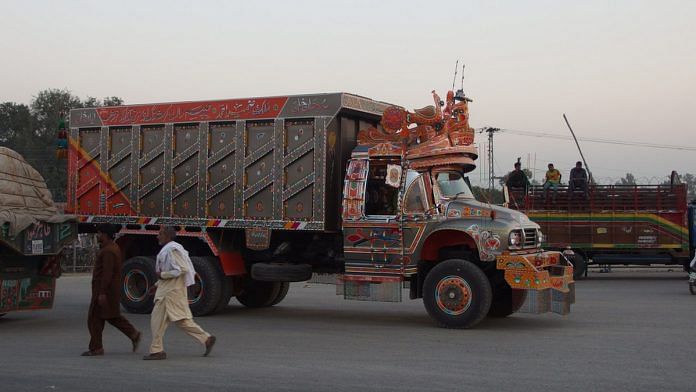Dubai: Economists from the United Nations (UN) and the World Bank have advised India and Pakistan against letting border tensions hamper their trade relationship.
“There are tensions between India and China (as well) but the business is kept out of the political or border problems,” said Dr Nagesh Kumar, director of social development division at the United Nations Economic and Social Commission for Asia and the Pacific.
“Adopting the same ideology, India should not hamper the bilateral trade relationship with Pakistan,” he added, speaking to ThePrint on the sidelines of a recently-concluded summit on the “Benefits of South Asia Economic Integration”, held in Dubai between 24 and 27 February.
“Irrespective of the present trade value with Pakistan, we must consider the potential of trade growth — which is at least ten times more than the present trade value,” said Kumar.
As reported earlier by ThePrint, at present, India exports $1.92 billion (approx. Rs 13,695 crore) worth of goods to Pakistan, while the imports from that country are worth $4.88 million (approx. Rs 34.8 crore), according to data from the ministry of commerce and industry.
Sanjay Kathuria, the lead economist at World Bank’s South Asia Regional Cooperation and Integration Unit, echoed the concern, pointing out that barriers in trade between India and Pakistan were evident in the fact that “it is 18 percentage points cheaper for India to trade with Brazil (in South America) than with Pakistan (its immediate neighbour)”.
“India and Pakistan have regimes that discriminate against each other, which is evident from the negative list both countries maintain,” he added, addressing the audience at the summit via video link.
“Pakistan maintains a list with around 1,209 items that cannot be imported from India whereas India maintains a negative list of around 600 items,” said Kathuria.
Quoting a World Bank report, ‘Glass Half Full: Promise of Regional Trade in South Asia’, of which he is the lead author, Kathuria said: “The trade between the two countries, which stands at around $2 billion, could go up to $37 billion if they worked through their differences.”
Also read: India’s withdrawal of MFN status for Pakistan has more to do with diplomacy than trade
Withdrawal of MFN status flagged
India and Pakistan, whose ties have never been smooth, are currently locked in one of the most tense phases of their relationship.
Last month, the Pakistan-based Jaish-e-Mohammed (JeM) claimed responsibility for one of the worst terror attacks ever perpetrated on Indian soil — the 14 February strike on a CRPF convoy that killed 40 personnel in Kashmir.
India, which has repeatedly called Pakistan out for harbouring terrorists, subsequently launched a campaign to isolate Islamabad diplomatically, and also revoked the ‘most favoured nation (MFN)’ status granted to Islamabad.
The MFN status is accorded by a country to valued partners to boost non-discriminatory bilateral trade. At the Dubai summit, economists pointed out that India’s decision to withdraw the MFN status would boost informal trade — that is, smuggling and corruption — via Dubai and Singapore.
“A significant chunk of trade between both countries is already happening through a third country — mostly Dubai and Singapore,” Kumar said.
“With the latest move of snatching MFN status, informal trade through a third country will get a major boost,” he added.
“Currently,” Kumar said, “the amount of total trade (formal and informal) between India and Pakistan is approximately around $6 billion. The worth of formal trade stands equal to informal trade… Unless the political and trade environment improves, informal trade will only continue to coexist and is likely to increase in the coming years.”
“The move [to withdraw MFN status] would increase the cost of exports for Pakistan apart from increasing the discrimination (between both nations). More trade will be diverted to informal channels, mostly through Dubai and Singapore,” said Kathuria.
Also read: Revoking Pakistan’s MFN status: Proportionate reply or Modi exploring diplomatic steps first?
Disclaimer: The writer’s trip to Dubai was sponsored by Arizona State University, the organiser of ‘Benefits of South Asia Economic Integration’ summit’.




With out safe home how you gonna do business with enemy? This guy is insane. If terrorist keep attacking your home n you retaliate them. This guy is advising keep going n do business as usual. When there is firecrackers are flying both side then you wanna break your enemy financially, defensively anyway you can weaken your enemy in a order to get upper hand. I guess this guy is Google educated fellow copy n paste. Bro reality is different then spouting from your desk. No wonder these millennium kids are dumb as hell.
No thanks. We dont want anything from Pakistan. Keep up the 200% tariff.
Given Pakistan’s huge trade deficit with India, it qualifies for MMMMMFN status …